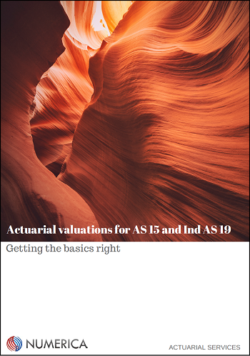
We often get asked: is actuarial valuation of future salary needed? Or, why don’t we just calculate the present value of future salary and hold that as a liability, just like we do for gratuity benefits?
Though AS 15 and Ind AS 19, both deal with the treatment of all employee benefits (except share based payments), it is sometimes not too clear which benefits require an actuarial valuation. For example, for certain benefits (such as salary), no liability is recorded in the balance sheet. For other benefits, such as gratuity or pension, an actuarial liability is required to be held on the balance sheet.
The general principle is that an actuarial valuation is needed only when the benefit:
1. Has been accrued in the past,
2. Is earned in exchange for the service rendered in the past,
3. Will be paid in future, dependent on pre-defined triggers (such as retirement)
4. Amount is reasonably certain.
With this principle in hindsight, let’s try to answer these questions about a few types of employee benefits:
Is actuarial valuation required for monthly salary?
The following hold true for monthly salary:
- Earned / Accrued over a month
- In exchange for service rendered in the respective month
- Paid out at the end of the month
- Amount is certain
Since the benefits are paid out immediately and not withheld to be paid in future, no liability exists and an actuarial valuation is not needed.
And what about annual bonus?
Under usual circumstances:
- Bonuses are earned / accrued over the year,
- In exchange for service rendered during the respective year and
- Paid out at the end of the year.
It can be argued that the bonus earned in the initial part of a year is withheld to be paid at the end of the year and therefore the annual bonus could require an actuarial valuation.
However, to require an actuarial valuation, a benefit needs to be ‘long-term’. As a general agreement, long-term means that benefit should be withheld for more than 12 months.
Further, the amount of annual bonus is usually contingent on a number of other factors, such as individual and company performance, which implies that the amount of bonus is highly uncertain.
Therefore an actuarial valuation of annual bonus is not necessary.
But then, I have heard actuarial valuation is required for deferred bonus…
That is right! Let us consider a situation where:
- a service is rendered by an employee
- bonus is earned for the period
but - the bonus is deferred to be paid after 5 years.
Such a benefit plan requires an actuarial valuation because:
- the benefit has been accrued (in exchange) for service rendered in the past,
but - will be paid in future.
Such schemes are quite common and known by various names such as Deferred Income Plan, Longterm Incentive Plan, Retention Bonus, etc.
Also, do we need actuarial valuation for annual leave?
Well! That depends on certain factors. Let’s look at three different variants of annual leave policy and if an actuarial valuation is needed.
- Let’s first consider a leave policy where:
– an employee is entitled for 20 days of leaves annually and
– any unutilised leaves lapse at the end of the year. Since no benefit is held back to be paid into future, an actuarial valuation is not needed. - Now, consider another similar leave policy where:
– unused leaves can be carried forward to the following year,
– but not beyond.In this case, some leave benefits that were:
– earned in the past
– will be payable in future
– but not beyond 12 monthsFor such a scheme an actuarial valuation could be needed.
However, most accounting standards do not require an actuarial valuation for any benefit payment falling due within 12 months. Also, approximate methods of estimating the liability are acceptable. - Lastly, consider another leave policy where unused leaves can be carried forward indefinitely.In this case, an actuarial valuation will be needed.
For more details on actuarial valuation of leaves, click here.
To know about actuarial valuation of other benefits such as gratuity and pension plans, click here.
An analysis of applicability of actuarial valuation on other schemes such as maternity leave, and a number of other topics are covered in the following whitepaper. Download now!

January 12, 2018 at 10:21 am, Venkatesh Iyer said:
Can we conclude that expenses that are treated as Revenue expenses do not need Actuarial Valuation and that which are Liabilities would need.
January 14, 2018 at 10:18 pm, Nasrat Kamal said:
I don’t think any valuation for future revenue is needed, unless the revenue relates to any goods/services that have already been provided in the past. In that case, you may want to value it as an asset. Similarly, if you have to pay out an expense in future, in exchange for goods/services availed in the past, you need to keep a liability (such as creditors). Actuarial valuation is not needed in any of these cases. You will use other types of valuation methods, specific to the nature of your cashflows and purpose of valuation.